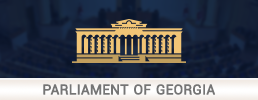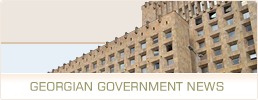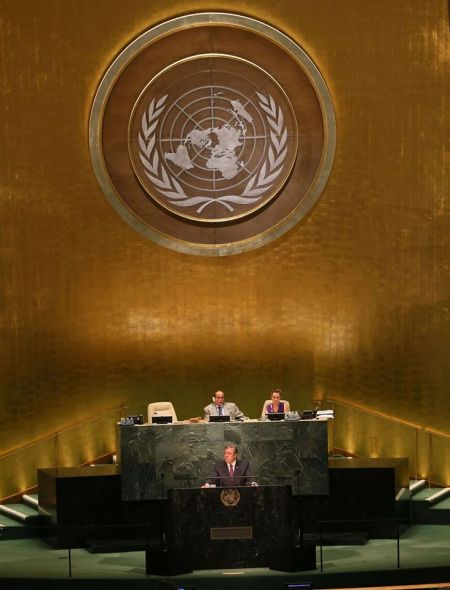2016-09-22
Mr. President, Dear Colleagues, Distinguished Delegates,
Ladies and Gentlemen,
It is my honor to address the General Assembly.
Georgia has promoted the values of the United Nations since regaining independence, 25 years ago. In return, the UN has served as a partner for us, one of the oldest nations in the world, in developing a free and democratic state.
Twenty-five years ago, few of us could have imagined this day.
Georgia has since transformed itself from a country ravaged by civil war into a dynamic European democracy.
We have made great progress in building strong and effective state institutions, ensuring:
- A free civil society,
- free media,
- free markets,
- social cohesion, and
- the rule of law.
We are proud to be ranked the 5th freest economy in the world, ensuring openness and integration into the global market and equal opportunities for all people interested in doing business in Georgia.
As of July, Georgia is an Associated country of the EU, harmonizing its policies, institutions, sectors and market rules with those of the European Union.
We are an aspirant country to NATO, having the deepest and most comprehensive partnership with the Alliance of any nation.
In the last few weeks, the US Government, the European Union, and NATO all took actions to emphasize that Georgia's future lies within the European and Euro-Atlantic community.
At its core, Georgia's foreign policy is aimed at building strong, mutually beneficial partnerships with the countries of our region and beyond.
This path, chosen by our people, leads to more stability, security, peace and prosperity in our country and the region.
The work never ends, though.
Today, we are poised to thrive in a new millennium. We are building an innovation-driven community with all generations looking over the horizon at an ever-brighter future.
We are building a country that will ensure the unification of war-torn communities and abolish the newest versions of the "Glienicke Bridge," which exist in the 21st century due to the continuous occupation of two of our regions, dividing peaceful societies on both sides.
A year ago we all together adopted a universal plan to better the world by setting 17 Sustainable Development Goals for the 2030 Agenda.
The much needed transformative agenda for 2030 is indeed impressive. But let's be frank. Despite the phenomenal blueprint of the MDGs, we as an international community could not live up to the challenge.
I welcome this year's focus on the transformative power of the SDGs. Let us make sure that in the 15 years that we have ahead we do our utmost to really fulfill if not all, at least a good majority, of the 17 goals.
To do so, we need to succeed nationally, and, at the same time, support others in meeting their national goals.
We also must remember how interrelated these goals are. We have to strive for peace and security by fostering development and vice-versa.
Our government has a vision for how to translate these goals into national actions.
This year, we launched a comprehensive 4-point reform plan, which is about making the development of our country a success for each and every citizen of Georgia and for the development and stability of the region.
Effective governance with transparent and accountable institutions is the key for building peaceful and inclusive societies and for sustainable development.
Focusing on SDG 16, we have made a clear break from the past by prioritizing good governance.
Two days ago, together with Estonia, the Republic of Korea and UNDP my country organized a special high-level cross-regional event aimed at sharing success stories on implementing SDG 16.
Let me reiterate that we remain committed to sharing our experience and extending support to those who are pursuing transformation.
Within Georgia, our goal is to ensure maximum inclusion of all stakeholders in the decision making process. We have created several platforms where we have regular dialogue with civil society and private sector representatives.
In promoting good governance, our aim is to make all public services even more accessible for business, and we have launched an ambitious project of a "Business House" in Tbilisi, capital of Georgia. It, together with an online platform, will serve as a one-stop-shop for businesses and as a front office for all government bodies.
Central to good governance is fair and efficient tax collection. Georgia is already one of the lowest tax burden countries in the world, but we are liberalizing our taxes further. In order to encourage business to invest in development, and thus in new jobs, we have taken a decision to abolish a profit tax on undistributed earnings.
Although it is a costly reform, it ensures the long-term sustainability of business and jobs.
We are also improving the tax administration system by strengthening the role of the judiciary in decisions on tax inspections, thus ensuring increased protections for the private sector.
Mr. President, the trend lines for Georgia are continuously improving:
The World Bank just reported that Georgia's poverty rate dropped more than 10 percent from 2012 to 2014. This is a major accomplishment.
In 2015, the unemployment rate continued to decline and is now at its lowest level in the past twelve years. Salaries and wages are up substantially compared to several years ago.
Georgia's economy is growing despite downturns all around us and foreign direct investment is way up, almost 100 percent higher than in 2012. This translates directly into jobs for Georgians.
Georgia now ranks 4th in terms of "ease of doing business" in Europe and Central Asia and is on the path to being a true "start-up nation."
In the history of independent Georgia there have never been so many opportunities for hard-working people with a dream to launch or grow their own businesses. Those with an entrepreneurial spirit have more chances to succeed than ever.
We have launched several projects that ensure access to capital and infrastructure for people with innovative ideas, especially those interested in manufacturing or farming in Georgia.
Distinguished Colleagues,
The path towards fulfilling sustainable development goals and building resilient and inclusive communities requires unlocking the hidden resource that every nation has: its people.
Accordingly, education is among our top priorities. We decided to tailor our education system to ensure it delivers for each individual and for our society and economy as a whole. We want every graduate of a professional or higher education institution financed by the government to be able to find his or her place in a competitive labor market.
We want an education system that is competitive and delivers quality education not only to Georgian citizens but also to foreign students.
The construction of two new private technical universities, with an estimated development cost of 1 billion euro, has started this year. We will soon be able to offer some of the best education opportunities in our region.
A healthy population is also key to further growth and development.
Several years ago, we launched a flagship program for universal health care. Today, all citizens of Georgia have heath care insurance, making medical care a reality for hundreds of thousands of our citizens for the first time.
We have also encouraged private investments in the health care system, which has resulted in hundreds of millions of dollars being invested in new private hospitals.
A new national e-pharmacy system that will streamline the delivery of medicines to patients is now being tested.
With the help of our partners, special programs to eradicate persistent diseases have been started and Georgia is set to become one of the first countries to eliminate Hepatitis C. We are especially grateful to the United States for their help with this initiative.
Mr. President,
Georgia's development agenda is first and foremost about our citizens and their equal rights. We believe in the power of free citizens and the role of government in ensuring freedoms and opportunities for them.
Sustainable development is not possible without human rights, access to justice, and effective, transparent, accountable, and inclusive institutions.
We have taken major steps to bolster the rule of law. We overhauled court systems, prosecutors' offices, judicial ethics, and attorneys' responsibilities. We gave more rights to defendants. We ended impunity by government officials.
All Georgians are now equal before the law and can benefit from a judiciary system that has gone through several waves of reforms to reach higher levels of independence and professionalism. We are continuing the reform process of the judiciary to achieve the highest international standards.
Today, Georgia is number 29 in the Rule of Law Index of the World Justice Project, ahead of a number of old and new EU members.
Other important steps address a regrettable problem we inherited: past human rights violations, with particularly egregious infractions in our prisons. We have acted swiftly and decisively to correct this.
The UN's Special Rapporteur on Torture and Inhumane and Degrading Treatment recently observed that the Georgian government has turned this problem around since its election in 2012. The changes, he notes, are visible and quantifiable. We did this by putting in place legal and procedural mechanisms for combating the mistreatment of prisoners, including compensation to victims.
We have enacted new anti-discrimination legislation;
We have worked hard to concretely advance gender equality and women's empowerment; and
We are implementing a National Action Plan to ensure equal opportunities for persons with disabilities. But there is still more to be done. For that purpose, we have set in place a new long-term comprehensive Human Rights Strategy and Action plan.
In less than three weeks, we will be holding parliamentary elections in Georgia.
The campaign started more than three months ago, and this period has been evidence of Georgia's real democratic development. With a free and pluralistic media and political environment, strong and vocal civil society, and the relevant legislative and institutional framework, we are ensuring a free, fair and transparent election process.
On the 8th of October the people of Georgia will win, and our democracy will continue driving our country to a sustainable future.
Dear Colleagues,
Sustainable development cannot be fully realized if it is divorced from the overriding issue of security. In Georgia, we are reminded of this every day by a harsh reality: 20 percent of our country is occupied by foreign troops-who took it by force.
Hundreds of thousands of people continue to be denied the right to return to their homes. We are grateful for the support offered by the UNGA resolution on the "Status of IDPs and Refugees from Abkhazia, Georgia, and the Tskhinvali Regions/so-called South Ossetia, Georgia." It is time to translate this measure of support into action.
Barbed wire fences installed by the occupiers divide Georgian families and communities. The populations in the occupied regions endure constant ethnic discrimination and gross human rights violations. Their freedom of movement and their property rights are restricted. They are even denied education in their native language.
I condemn the recent act of holding elections to the Russian State Duma in Georgia's occupied territories, which is another part of Moscow's annexation policy.
And this all happens in the absence of any international monitoring, except for the limited involvement of the European Union Monitoring Mission, which has been denied access to the occupied territories.
The ongoing occupation and steps towards annexation remain the greatest existential challenge inherited by our government.
We have been seeking a workable solution with the Russian Federation. We have made some concrete progress in de-escalating tensions, but Georgia's steps forward have not all been reciprocated.
The Russian Federation has yet to honor even the EU-mediated ceasefire Agreement of August 2008.
Against this backdrop, I would like to once again reaffirm that this conflict must be resolved peacefully, based on the full respect of Georgia's sovereignty and territorial integrity within its internationally recognized borders.
We will continue to respond to the concerns of people living in the Abkhazia and Tskhinvali regions and reconcile the war-torn communities across the occupation line. To this end, we will make all benefits of our European agenda and economic opportunities available to the people residing in the occupied territories.
Our investment in the prosperous future of a united Georgia is additional stimulus for building confidence and reconciliation.
We will invest more than 5 billion USD in connectivity and infrastructure in the next 4 years.
We will connect regions of Georgia with each other as well as connect Georgia with the wider region. Thanks to Georgia's strategic location, our ports, roads, and transport networks will be an important part of the ambitious and transformative Silk Road development plan connecting Europe and Asia.
We are investing not only in infrastructure, but in policy platforms as well.
The Tbilisi Silk Road Forum proved to be a major success, attracting the involvement of 35 countries.
In particular, we are honored and excited to be working with China and other nations of the Silk Road to provide a critical piece of a new trade and investment corridor that will benefit the entire world.
When we talk about connectivity, we must not omit the Internet, perhaps the greatest driver of global cooperation.
Therefore, we have started the development of a country-wide broadband system that will bring the benefits of the Internet to the most remote villages and farms. Georgia is proud to be on the list of top countries for internet freedom.
Ladies and Gentlemen,
Mr. President and distinguished colleagues, I am proud to be speaking to you on behalf of Georgia at a time when we are on the rise and at the center of new developments connecting East and West.
It is in this spirit that we seek to create a more secure and prosperous region, grounded in principles of sustainable development.
We are working hard every day to take real actions that enhance the lives of our people while respecting their rights, their beliefs, and their cultures.
We look forward to continuing to work with the United Nations on achieving a shared vision for a better future.
I thank you.












